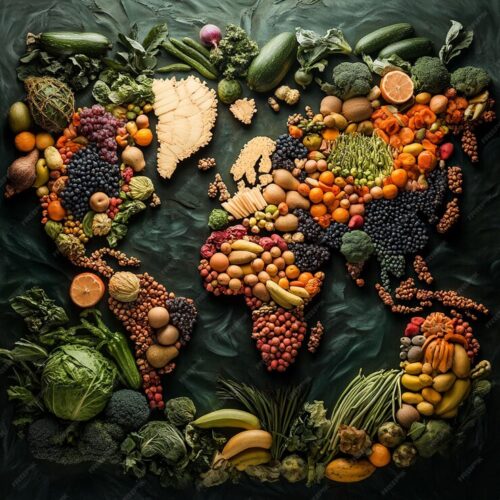Table of Contents
Introduction to Frozen and Fresh Ingredients
The choice between frozen and fresh ingredients is a topic of significant interest among consumers today, as many strive to strike a balance between health, convenience, and culinary excellence. Fresh ingredients are typically defined as those that have been recently harvested, minimally processed, and require little to no preservation beyond refrigeration. These ingredients are often lauded for their vibrant flavors, enticing textures, and superior nutrient profiles. When utilized promptly, the benefits of fresh ingredients can enhance the taste and nutritional value of meals, making them a preferred choice for many home cooks and professional chefs alike.
On the other hand, frozen ingredients are those that have been harvested at peak ripeness and immediately subjected to freezing processes for preservation. This method locks in the nutrients and flavors, allowing for longer shelf life while maintaining ingredient quality. Frozen ingredients are often seen as a convenient alternative, providing versatility and accessibility year-round—particularly for out-of-season produce. Despite a common misconception that freezing diminishes nutritional quality, studies indicate that the superiority of fresh ingredients may not be as clear-cut as it seems, as frozen options can retain their nutritional integrity when processed correctly and consumed within a reasonable timeframe.
As our lifestyles evolve, so too does our approach to cooking and meal preparation. Growing interest in the nutritional and culinary differences between frozen and fresh-ingredients reflects a broader trend towards health-conscious eating and informed food choices. Consumers are increasingly seeking clarity on this topic, seeking to understand how both frozen and fresh options can play a role in maintaining a balanced diet. This exploration not only addresses concerns about ingredient quality but also highlights the practicality of incorporating both forms into everyday cooking.
Common Myths Surrounding Frozen Ingredients
There are numerous myths regarding the quality of frozen ingredients, particularly comparing them to their fresh counterparts. One of the most prevalent myths asserts that frozen ingredients are less nutritious than fresh-ingredients. However, research indicates that this assumption is not entirely accurate. In fact, many frozen fruits and vegetables are harvested at their peak ripeness and then promptly frozen. This process helps to lock in essential vitamins and minerals, often making them just as nutritious, if not more so, than their fresh counterparts that may spend several days in transit before reaching the consumer. In essence, the belief that frozen ingredients suffer from inferior ingredient quality is a misconception and fails to consider these key factors in the freezing process.
Another common myth suggests that frozen-ingredients lack flavor, leading many to prefer fresh items in their cooking. While it is true that some fresh ingredients may have a more pronounced taste when in season, modern freezing techniques have significantly advanced in recent years. These methods, such as flash freezing, capture and preserve the flavor profile of the ingredients effectively. The variety in freezing techniques enables the locking in of flavors, which can sometimes even surpass that of fresh ingredients which may lose taste over time. Therefore, the notion that frozen options lack flavor is misleading, as they can still deliver vibrant tastes similar to, and occasionally surpassing, those of fresh items.
In addition to these myths, it is crucial to consider the context in which frozen-ingredients are used. Preparing meals with frozen foods can be both convenient and practical, ensuring that you have a diverse array of ingredients, regardless of the season. Thus, embracing the benefits of fresh-ingredients along with the availability of frozen alternatives can provide a comprehensive approach to cooking that maximizes both nutrition and flavor.

Debunking Misconceptions About Fresh Ingredients
Many consumers operate under the assumption that fresh ingredients are always of superior quality compared to frozen products. This perception is not entirely accurate, as the benefits of fresh ingredients often depend on various factors such as the seasonality of the produce, transportation, and storage conditions. While fresh-ingredients can indeed provide exceptional flavor and nutrition, there are instances when frozen alternatives surpass their fresh counterparts in terms of ingredient quality. For example, fruits and vegetables picked at their peak ripeness and frozen shortly thereafter can maintain higher vitamin levels compared to those that have traveled long distances and spent time in storage. Thus, the superiority of fresh-ingredients is conditional and should be assessed on a case-by-case basis.
Another common misconception surrounding fresh-ingredients is the belief that they have a longer shelf life than frozen ones. It is essential to recognize that the shelf life of both fresh and frozen ingredients is influenced by multiple factors, including storage conditions and the inherent perishability of the item. Fresh produce can spoil rapidly, particularly if not stored properly. On the other hand, frozen ingredients can last significantly longer, often for months, without losing their nutritional value or flavor. Understanding these dynamics is critical when evaluating ingredient options and making informed decisions about ingredient choices for daily meals.
Ultimately, while there are clear benefits associated with fresh ingredients, including enhanced taste and culinary experience, the notion that they are categorically superior requires further scrutiny. In many cases, frozen-ingredients not only match but can exceed the benefits of fresh options in certain contexts, providing a reliable and nutritious alternative. By being aware of these misconceptions, consumers can make better-informed choices aligned with their culinary and nutritional needs.

Benefits of Using Frozen Ingredients
Frozen ingredients offer several practical benefits that make them an attractive option for many home cooks and busy individuals. One of the primary advantages is convenience and accessibility. With frozen ingredients, meal preparation can be simplified greatly. Frozen fruits and vegetables are washed, cut, and ready to use, which significantly reduces the time spent on prep work. For those leading hectic lifestyles, this ease of use turns cooking from a chore into a manageable task, allowing for swift meal creation without compromising on nutritional value.
Additionally, frozen ingredients play a vital role in waste reduction. Fresh produce often has a limited shelf life, leading to spoilage and unnecessary waste if not consumed promptly. In contrast, frozen-ingredients can be stored for extended periods without losing quality, allowing individuals to use only what they need. This ensures that meals can be planned around what is on hand, minimizing waste and making meal planning more efficient.
Cost-effectiveness is another critical benefit to consider. Frozen-ingredients tend to be more economical in comparison to their fresh counterparts, especially when it comes to seasonal items. Purchasing frozen fruits and vegetables often costs less, providing an affordable option without sacrificing ingredient quality. Moreover, freezing preserves the freshness of produce at the peak of its season, potentially enhancing the overall culinary experience.
It is essential to acknowledge that the quality of frozen ingredients can be exceptional when compared to fresh options. Factors impacting quality include how the ingredients are harvested, processed, and frozen. To make informed choices in cooking, consumers are encouraged to assess ingredient quality, consider frozen foods alongside fresh produce, and appreciate the benefits of fresh ingredients alongside the notable advantages found in frozen ones.




Pingback: Cream Cheese Wontons: Dive into a World of Delicate Cheese
Pingback: Easy Elote Corn Casserole | Mexican Street Corn Bake